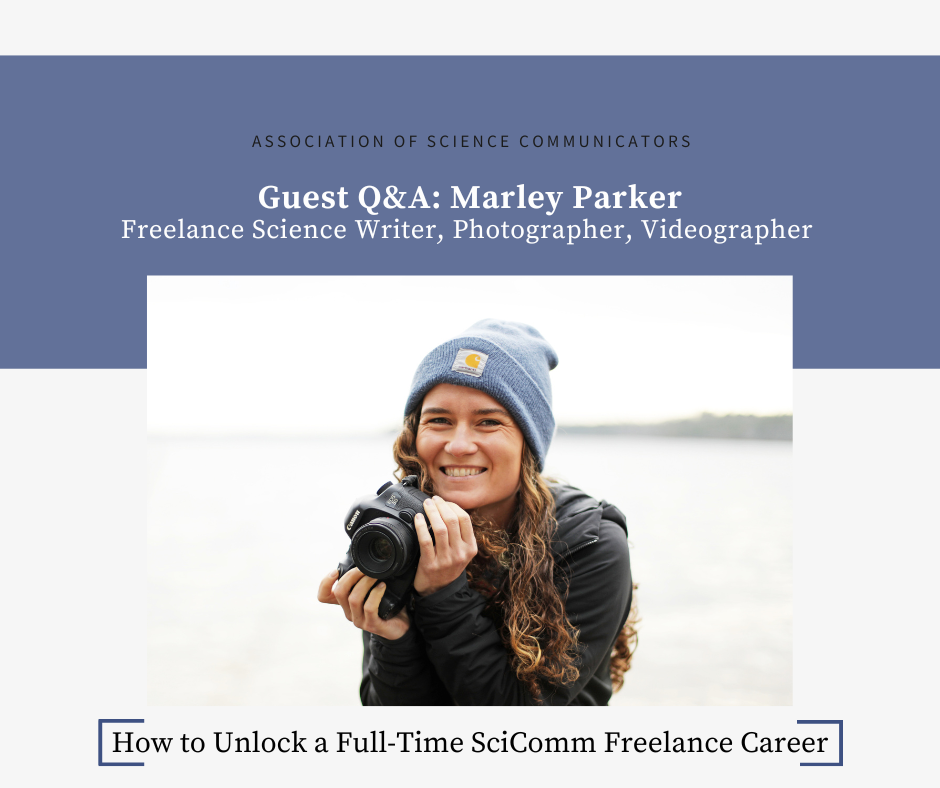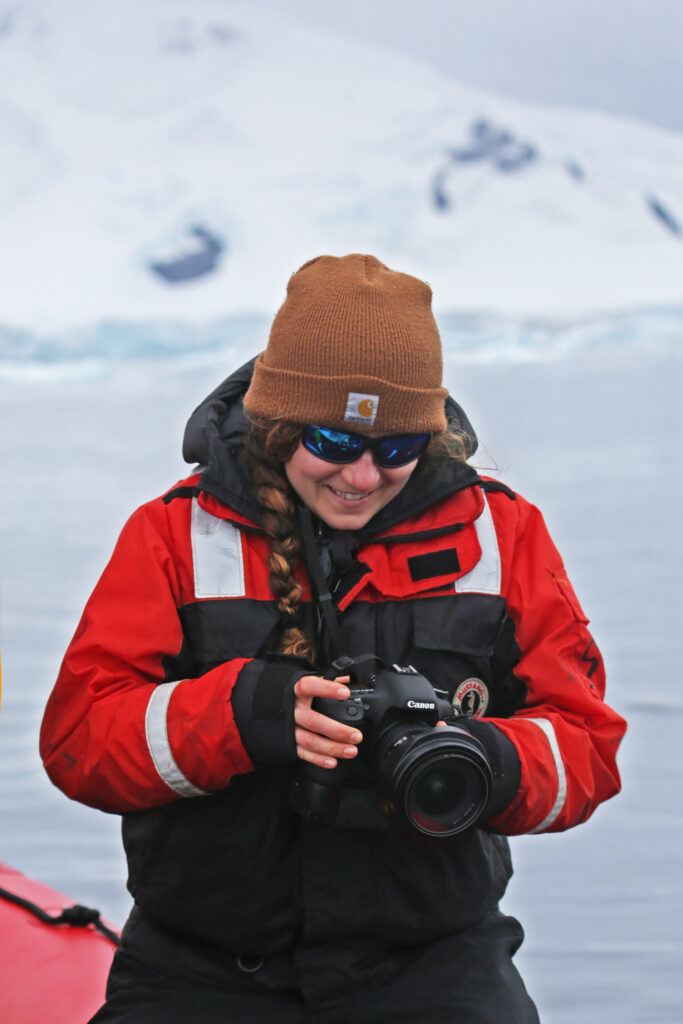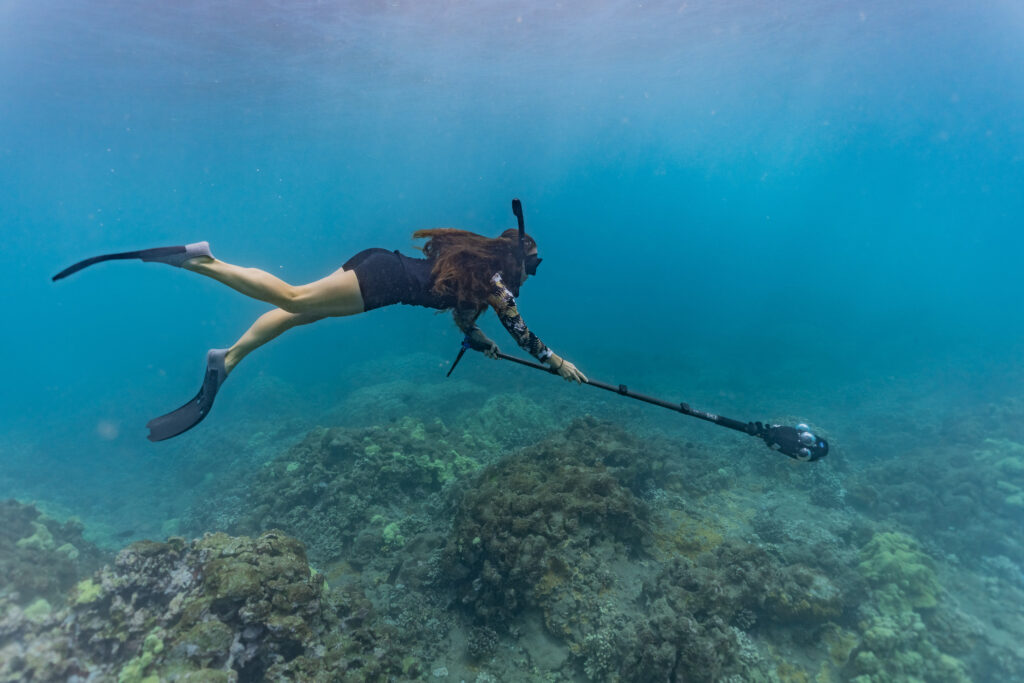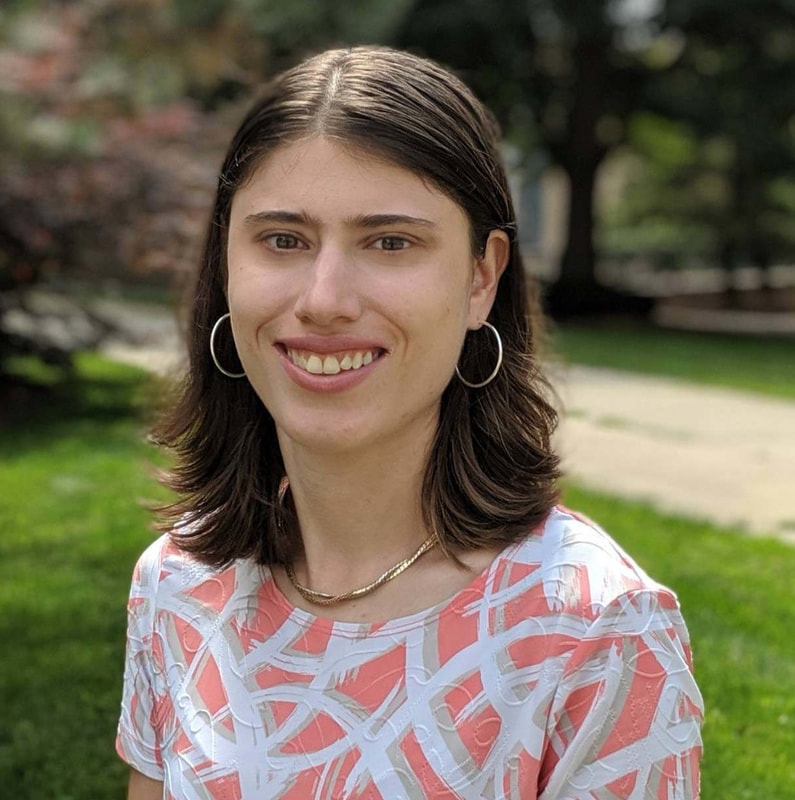
Interest in full-time scicomm careers is skyrocketing, but landing a full-time position that matches your experience and interests can be harrowing. And navigating a freelance career can seem overwhelming without a guide.
After hearing her present at Science Talk ‘22, the Association of Science Communicators (ASC) reached out to Marley Parker, freelance science writer, photographer and videographer, about helping others understand the world of freelance scicomm.
ASC Co-Founder and President Dr. Allison Coffin sat down with Marley—who called in from a ship off the coast of Hawaii where she’s currently documenting work for a marine research team—to talk about how she transformed her journalism degree into a full-time freelance science communications career.
Allison Coffin: You’ve had a less traditional journey to your career as a full-time science communicator. Can you tell us a little bit about your background, where you started your career, and what kind of freelance work you’re doing now?
Marley Parker: I graduated from UNC-Chapel Hill with a degree in journalism, specializing in photojournalism. At the time, I expected I would go on to work for a traditional newspaper or magazine, but when I graduated in 2010 I was met with the perfect storm of a recession and shrinking newsrooms as digital media grew. I ended up getting a video production internship at the UNC College of Arts & Sciences. After a year there, I switched into a full-time position at the UNC Office of Research Communications, interviewing researchers on campus about the science they were conducting. I touched everything from medicine and public health to geology and marine science. That was my first crash course in becoming a science communicator.
My favorite part of that job was traveling to the coast of North Carolina to work with scientists at the UNC Institute of Marine Sciences. As I produced more and more ocean science stories for UNC, researchers at other institutions started to notice my work. In 2017, a team from Duke University asked if I would be interested in joining their research expedition in Antarctica.
It was a once-in-a-lifetime opportunity, but it came with a catch – the expedition was six weeks long, and I couldn’t take that much time away from my full-time position at UNC. So I had to make a decision: pass on Antarctica or quit my job. I did the latter, and I’ve been a full-time freelance science communicator specializing in expedition work ever since.

AC: What were the biggest challenges, or perceived challenges, when you were making the shift from a traditional job to a full-time freelance career?
MP: People always ask me, what’s the scariest thing you’ve ever done? And I always tell them, it’s not swimming with sharks or jumping in the water in Antarctica – it was leaving the security of my full-time job. I had supportive colleagues, a 401k, good health insurance, and I was really scared to leave all of that without knowing where my next paycheck would come from or if I could make enough money as a freelancer to support myself. On top of that, I was nervous about self-image stuff – what if I told everyone I was starting my own business and then a year or two later I was bankrupt? What if my dream turned out to be a complete flop? In hindsight, I’m so glad I didn’t let those fears stop me.
Now that I am an established freelancer, I would say the most consistent challenge is the volatile nature of this business. It’s not uncommon for jobs to get canceled at the last minute, especially during pandemic times. But I would say I’ve become much more comfortable with that volatility and unpredictability.
It was a slow start and I certainly wasn’t making a lot of money in the beginning, but I made enough to get by. Flash forward five years: I’m earning more than I’ve ever made in my life and I’m doing something I love day in and day out. The longer I do this work, the more empowered I feel. I am growing my business, traveling to far-away places, learning new skills, and encouraging other people interested in this type of work to do the same. For me, all of those factors outweigh the volatility.
AC: What are some of the most rewarding aspects of working as a full-time freelancer?
MP: It’s so liberating to have this level of freedom and flexibility. Just this year, I spent a month living and working on a ship in the Caribbean. I spent 50 days working in Hawaii. I could never have those kinds of experiences if I still had a traditional full-time position.
Even after five years, the work itself continues to blow my mind. Filming deep sea corals in the South Pacific, photographing whales in Antarctica, flying a drone to capture sunrise off the coast of Hawaii – I have to pinch myself constantly. When I started my career in photojournalism, I never dreamed I would document these types of experiences.
But the best part of expedition work is the people. Living and working together on a ship forms a unique bond between people, and I feel so lucky to have special connections and shared experiences with my shipmates from all over the world.

AC: I’ve been able to hear so many of your amazing stories at sea. Would you be able to share one or two with the ASC community to give a teaser of some of the best days on the job?
MP: There are honestly so many amazing, truly out of this world, “I can’t believe this is my life” sort of moments. One of them was just two weeks ago working on an expedition in Hawaii with marine mammal researchers. I had the opportunity to jump in the water with this massive camera and film a huge pod of 70 or 80 dolphins swimming all around me. It happened really fast, but I will never forget that moment. That’s something my younger self watching dolphins from the beach would’ve lost her mind over. I still lost my mind as an adult.
I had another incredible day recently where our field work team for the day happened to be entirely women. Broadly speaking, the environments I work in (science and ships) are male dominated. Spending a full day on the water alongside only women is a rarity, and it’s a completely different experience. The conversations we had that day were different, and there was an immediate comfort, understanding and acceptance. The self-awareness or inner dialogue that can be critical or self-consciousness evaporated when I realized I was surrounded by all of these amazing women who are so strong and so good at what they do. It was such an empowering day of work. On top of that—or maybe because of that—we had a day of really good, efficient work.
That day was only the second time I’ve worked on a boat with an all female field work team. I’m really passionate about getting more women and underrepresented groups into this type of work, so that experience filled my heart in a big way.
AC: You’re teaching a course on scicomm freelancing for ASC members in November. Can you share a little bit about what you’ll be covering in that course?
MP: The main goal of this course is to tell people who are interested in a freelance scicomm career – whether it be full-time or as a side hustle – the things I wish I had known when I first started out.
When I first started my freelance business, I really wanted to get as much advice and industry knowledge as possible. But the only full-time freelance photographer I knew was a wedding photographer. She gave me some good, general advice, but so much of her work experience and environment was completely different from mine.
Looking back, I wish I had met someone like me who specializes in science communication and working with research teams. Now that I have five years of experience, I want to offer up the knowledge I’ve gained to people interested in doing this particular type of freelance work.
My four-week course for ASC will cover:
- Expanding your professional network as a freelance science communicator: what works and what doesn’t
- Getting tech savvy, from building a website and navigating social media, to email marketing and creating newsletters
- Navigating contracts, setting up an LLC, figuring out rates and finances
- Becoming empowered to leave your full-time position and commit to full-time freelance work, maintaining that empowerment in moments of doubt
The course is now open for registration and will take place every Tuesday at 8pm ET for the month of November beginning November 1st.
AC: What advice would you give other aspiring scicomm professionals looking to change course in their career? What advice did you wish you’d been given when you started out?
My advice would be to recognize it is scary, it is daunting, and you should absolutely do it anyway. It’s a big jump and a big transition, but if you wait for the moment when everything is perfect, you’ll never begin. It’s easy to think about something and plan for “one day”, but life happens fast.
I would also say you don’t need a PhD or even a degree in science to be a science communicator. There is a strong push in STEM right now to prioritize diversity and inclusion and provide more access. Creating different types of careers in STEM is a part of that effort. If you’re interested in this kind of work, there is a path to get there – even if you have to create the path yourself.
To become a member of ASC and register for the course, visit the ASC website. Marley and Alli will also be speaking at Sigma Xi’s IFoRE meeting next month as part of the #SciCommSunday event.
To keep up with Marley’s freelance career and sea adventures, follow her on Twitter and Instagram, or check out her website at mlparkermedia.com.



Leave a Reply